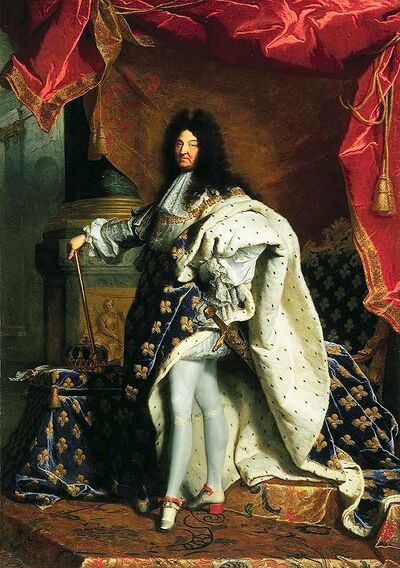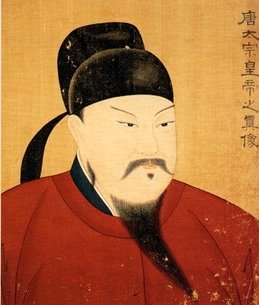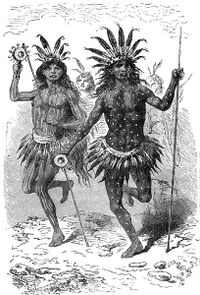18th century
| ||||||||||||||||||||
This page is a member of the Uncyclopedia Timeline. If an event isn't listed in the timeline, it most likely happened.
Represented here are the time periods from 1701 to 1800.
The 1700s was an interesting era located between the Industrial 1800s and the Salacious 1600s. Deceptively nicknamed the 18th century, the 1700s likely lasted from 1701 to 1800, in accordance with the Anno Domini/Common Era numbering system. Some historians speculate that it actually lasted from 1700 to 1799, but the historian community is too busy with more important stuff[1] to reach a consensus. Additional historians tend to differentiate between the "Short" 18th century (1715 - 1789), which comfortably resides within the boundaries of the actual 18th century, and the "Long" 18th century (1688 - 1815), which gets all up in the 17th and 19th centuries' business.
The 18th century was a time of great opulence, feasting, drinking, and lusting after frilly golden pantaloons. Education could only be afforded by the social elites,[2] and social status was determined by how ridiculously ostentatious someone's wardrobe was.[3] This interconnectedness created an environment that greatly disfavored social mobility and an economy that largely relied upon haberdashery and sequin futures.
Also, this book says there were some revolutions or something. Hm, must be a misprint.[4]
1700 - 1750ish: The Hoppin' Half Century[edit]
Louis XIV's Final Fête[edit]
The first decade of the 18th century was defined by Louis XIV's legendary decades-spanning "Turn of the Century" party. The fête, which started in 1698 and ended with the king's death in 1715, served as a drunken detente to ease developing tensions between blue-blooded aristocrats the Known World over. It also served as a literally golden opportunity to get drunk off of first-class bourbon served from diamond-encrusted codpieces. Naturally, all of the world's finest political and philosophical minds attended.
Louis' party hit any early peak in 1700 when a fatal kegstand by Hapsburg ruler Charles II sparked the War of Spanish Succession. Phillip of France, who did Charles a solid by providing him with a horse to get to the party[5], was crowned king of Spain in his wake. However, Phillip was also next in line for the French throne, putting him in a position to greatly upset the European balance of power[6].
Time was of the essence, since Louis XIV was constantly in peril of suffocating to death on his own jewelry. The Austrian Hapsburgs, the Holy Roman Empire, The Scandanavian Sonics, and basically every other nation in Europe united to do battle against the French monarch. Louis, who spent 80% of his country's gross domestic product on imported beer and hookers, sent in hundreds of thousands of peasants to the front lines with wooden sticks and no armor.[7] Neither the Hapsburgs nor Louis wanted to risk damaging their valuable possessions in the fray, so they agreed to fight the entire war on Dutch and Prussian soil, which was widely regarded to be completely worthless after they exported all their beer and hookers to France.
A Stringy Situation[edit]
In the War of Spanish Succession, several hundred thousand commoners died while those in power took turns playing the world's tiniest violin, a recent innovation by Antonio Stradivari. While the war created a slight dent in the grain production and virtually destroyed the nation of Prussia beyond repair[8], all economic damages were offset by Stradivari's record-breaking violin sales.
In a rise that can only be described as stradispheric, Antonio Stradivari cornered the luxury goods market when his workshop Stradivari's Strings 'n' Things went public in 1711. Through a clever newspaper advertising campaign, Stradivari managed to attract all 1100 literate Europeans as clients. His role in shifting the artistic focus of 18th century Europe from Baroque finger-paintings to orchestral music was more than instrumental[9]; his strings became as vital to social status as cellulose strings were[10] to celery. It is speculated that Stradivari's golden age helped end several wars, convincing many lords to end the senseless violence and spend their military budgets on senseless violins instead.
Though he worked at a glacial pace, only constructing just over 1000 instruments in a 50 year period, Stradivari continually experimented with his creations, achieving a unique harmonic perfection with each new design. His developments in String Theory created a new standard for violins, violas, cellos, lutes, mandolins and slap-basses, while also paving the way for more modern technology such as thong underwear.
Stradivari retired in 1737 after completing an ostentatious double-necked cello. Only then the craftsman decide to seek an apprentice, who brutally murdered him and snatched a handful of mandolins on the way out the door. Stradivari's business thus died with him, and while his longtime rivals Steinman's Discount Pianos took over the musical market in the ensuing decades, his legacy lived on for centuries[11].
Meanwhile, in Russia[edit]
Thanks to the actions of one Peter the Great, née the I, Russia's existence suddenly became notable. A strange and exotic land located in the Far East of Europe, Russia found itself the victim of a radical renovation at the hands of the extremely flamboyant Peter, deadly monarch and master of interior design. He passed out in the street one evening in front of the Stumbling Cossack after a long night of vodka and wallpaper, only to awake completely robbed and completely naked. Rather accustomed to such events, he knocked on the nearest peasant's door only to find the occupants as naked as he.
"What is the deal with all this flagrant nudity?" asked the nude king, reeking of triple-distillation and pork fried rice.
"We cannot afford to buy clothes, good sir, for we are all slaves to the land," replied a gaunt man just before he was brutally flogged to death by his landlord. The rest of the slaves scattered, leaving just the landlord and the Great. The landlord pitched him an evil glance from his slanted, Russian eyes.
"What you rooking at? You want me frog you too?" said the landlord in a thick Russian accent, comically unable to use correct syntax or pronounce the letter "L." No one talked to the king that way! Peter hurried his naked ass back to the palace and declared a pogrom upon the rude slave owner. This proved to be an extremely inefficient crusade, for after the slave owner was found, brutally beaten, locked into a tiny underground cell and given the infamous Russian water torture for six days straight, then drawn, quartered, peed on, and eaten by Peter's unemployed cousin Mitch the Not So Great, Peter was left with a big bored army with nothing else to pogrom. Peter, however, kind of liked killing the slave owner, but couldn't be certain if it was because the slave owner was a slave owner or just an asshole. Peter murdered another nearby slave owner just to be sure. Then another. He abolished slavery nationwide once he was positive it was because slave owners were slave owners.[12].
The end of slavery in Russia was celebrated vigorously. Most notably by the hard-working, natural-born Russians whose jobs had been stolen by the slaves, on account of the slaves' outright refusal to accept the wages gifted to them from their gracious, wealthy noblemen. On the other hand, Peter now suffered the rage angry noblemen who faced the dismal reality of paying their workers literally hundreds of half-pennies a year. The noblemen showed their anger by refusing to send Peter their taxes that year, hoping to break the back of Peter's government-sanctioned slave rebellion. To make up the funds missing from the noblemen, Peter did what any good leader would do. He raised taxes for the poor. Specifically, he raised taxes on Russia's three most important resources: Salt, Alcohol, and Beards. At this, Peter's son and heir, Alexei the Well-Bearded entered the scene to buzzkill everything. He came out against his father's new taxes on the Russian poor, and on well-groomed beards that, according to Alexei's journal, "some people had been growing since they were, like, 15, even if their fathers hadn't been paying enough attention to them to even notice that their new laws might upset the people that love him the most." Peter was touched by Alexei's show of support of the Russian people, as well as the beard that Peter just now noticed his son had. Peter responded in the only way a good father would. He brutally murdered his son. No, excuse me. He brutally tortured his son, removing various unnecessary body parts and, finally acquiescing to Alexei's wishes, brutally murdered his son. He also added new parts to Alexei's request[13] by executing him in public, and displaying his rotting corpse in the Town square for well over a year.
This radical reform in a now pro-child mutilation Russia, coupled with the abolition of slavery, was a cause for celebration in the Known World, which was finally getting used to Russia being a part of it and got ready to induct the nation as an official member. Still, there was hesitation regarding Russia's extreme poverty and lack of ostentatiousness to compensate. Peter responded to these allegations by forcing a million newly freed slaves into forced, unpaid labor[14] to construct the world's largest palace. This rhinestone-encrusted, 500 square mile modernized monstrosity named St. PetertheGreat'sburg wiped that dumb smirk off Europe's face; by declaring the city-house to be his own personal playground, Peter the Great set the bar for ostentatious autocracy prohibitively high[15].
The Hapsburg Empire Strikes Back[edit]
While Russia was busy legitimizing itself as a nation, the delicate balance of power in the Known World was set to topple over like a ten-foot-tall wig laden with too many ruby crowns.[16] Things came to a head in 1739 when British Captain Robert Jenkins lost his ear in a friendly game of bridge gone horribly awry. As they typically do when they lose a game of bridge, Britain declared war on Spain, metaphorically slapping them upside the head with a solid gold gauntlet.[17]
The War of Jenkins' Ear was set to be just another war about yet another British person losing bridge and getting his ear cut off, but the perennially bored monarchs of Europe decided to intervene on a whim. The whole matter of the war of Polish Succession was rather boring, it being Polish and all, and was promptly forgotten about when this superior opportunity for war came about. In fact, Hapsburg monarch Charles VI got so excited for a new big war that he choked to death on his broiled squid Bolognese in a pulverized diamond vinaigrette.[18] This left a troubling vacancy in the Hapsburg throne: who would get to control the dynasty and inherit its 500,000 acres of peacock farms? The answer was Maria Theresa, a woman. Naturally, this sort of joke wasn't found funny by the rest of Europe, which decided to correct things in Austria and install a man as the new emperor.[19]
The small war between Britain and Spain suddenly ballooned to involve every major force in Europe, some minor forces, and a handful of confused children. The first big war was a great delight for all the nobles to play, but the War of Spanish Succession II: Austrian Boogaloo reeked of sequelitis. Fearing that the peasants might lose interest if the war was merely fought on the wastelands of Germany and the Netherlands again, the major powers upped the ante considerable, bringing the New World colonies into the fray.
Oh, did I forget to mention there's a New World?
The Land of Gold and Honey and More Gold[20][edit]
When the God-given, God-driven European culture of wealth and enormity swelled in the late 15th century, the righteous search for more wealth expanded to points unknown, beyond the distant seas. Early expeditions by the Dutch and Spanish into the lands of Eastern New Europeshire and Southern Eastern New Europeshire, colloquially known as North and South America, respectively. Over the course of the next three centuries, the Americas were transformed from an uninhabited, unmined jungleland into a veritable gravy train of gold and rape. This was generally a great thing for anyone of any importance.
North America[edit]
By the middle of the 18th Century North America was generally controlled by British and French colonialists, minus a small settlement of Spanish retirees in the southeast. Great Britain controlled the eastern seaboard, while France controlled the north, and central areas of North America. The indigenous Indians controlled the Spirits of the Wind, Great Wolf, and Bear, but not any firearms. This got them about as far as you would expect. With the pesky natives mostly out of the way, Britain and France shared a colonial border; this went about as well as Great Britain and France sharing the same Channel did, and war were declared.
France, in a controversial stunt, recruited the help of the remaining Indian population to defeat their dastardly crumpetmongering villains. It was just the kind of bump the warring European Aristocracy needed for sweeps month, and the First French and English and Sometimes Indian Wars were handily lumped in with the faltering War of Austrian Succession. Early battles tilted in French and Indian favor; the savage nations who fought with the French were unfamiliar with the concept of ownership, and thus were not swayed by Great Britain's primary tactic of bribing enemy soldiers with fancy pocket watches and lifetime supplies of English Breakfast. The battle raged at a standstill for four whole, terribly boring years, until a boat from Europe finally arrived informing the colonies that they can stop fighting. The British colonies rejoiced this serendipitous end, as they were finally starting to run out of tea, and vowed never to waste tea on a war effort ever again.
South and Central America[edit]
Soundly under Spanish and Portuguese control, delivering gold, spices and women to their European hosts at a steady efficient pace the entire century. Though it says here that there were some stirrings of discontent in Paraguay and Brazil... no matter, I'm sure nothing came of it.
1750 - 1799: The Bloated Back Half[edit]
If the first half of the 18th century was defined by egregious opulence, rampant colonialism, and frivolous military theater, then the back half of the century took a lesson from these shenanigans and multiplied them tenfold. In France, it became a felony to wear a featherless cap or no cap at all, and a misdemeanor to sport anything less than three ostrich feathers. The Duchy of Bavaria suffered a brief economic downturn when its top currency forecasters suffered fatal bludgeonings from their solid gold wigs. Maria Theresa, in a therapeutic effort to get over her measured loss and political betrayal from Spanish Succession II: Austrian Boogaloo, hunted peasants for sport on elephantback.
Footnotes[edit]
- ↑ Such as leap years.
- ↑ Who were also, coincidentally, the socially acceptable.
- ↑ To complete the cycle, educators would limit themselves to teaching courses such as "How to hunt for mink", "Large-Scale Wig Engineering" and "Bling 101."
- ↑ Like I always say: you can't trust anything that isn't printed on turtleshell parchment.
- ↑ And would have served as the designated driver had the king made it out alive.
- ↑ It would take several months to realize this, as all of Europe's scales were being used by Louis to measure and distribute assorted drugs.
- ↑ This was also his original intention.
- ↑ Though poor fashion choices sealed its fate years prior.
- ↑ That pun really strikes a chord! A harpsichord!
- ↑ And still are!
- ↑ This legacy culminated in 1998 when a Canadian film about violins managed to reinvigorate Samuel L. Jackson's career.
- ↑ Four days and fourteen corpses later.
- ↑ Alexei never was any good at showmanship
- ↑ Completely dissimilar to slavery
- ↑ Only to be matched in 1813 by Napoleon's construction of the man-made island resort Elba
- ↑ As was the style at the time.
- ↑ As was the style at the time.
- ↑ As was the diet at the time.
- ↑ A woman on a throne is absolutely preposterous. You can't get menstrual blood out of velvet, you know.
- ↑ And the sweet, sweet Indian Honeys. Hubba hubba!




